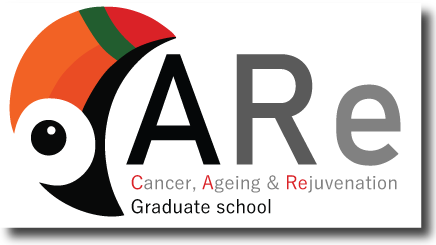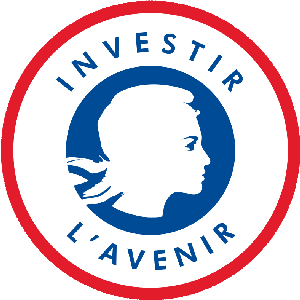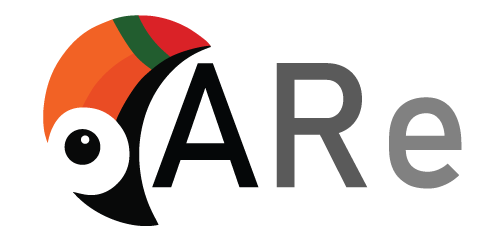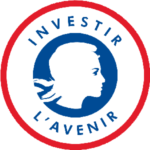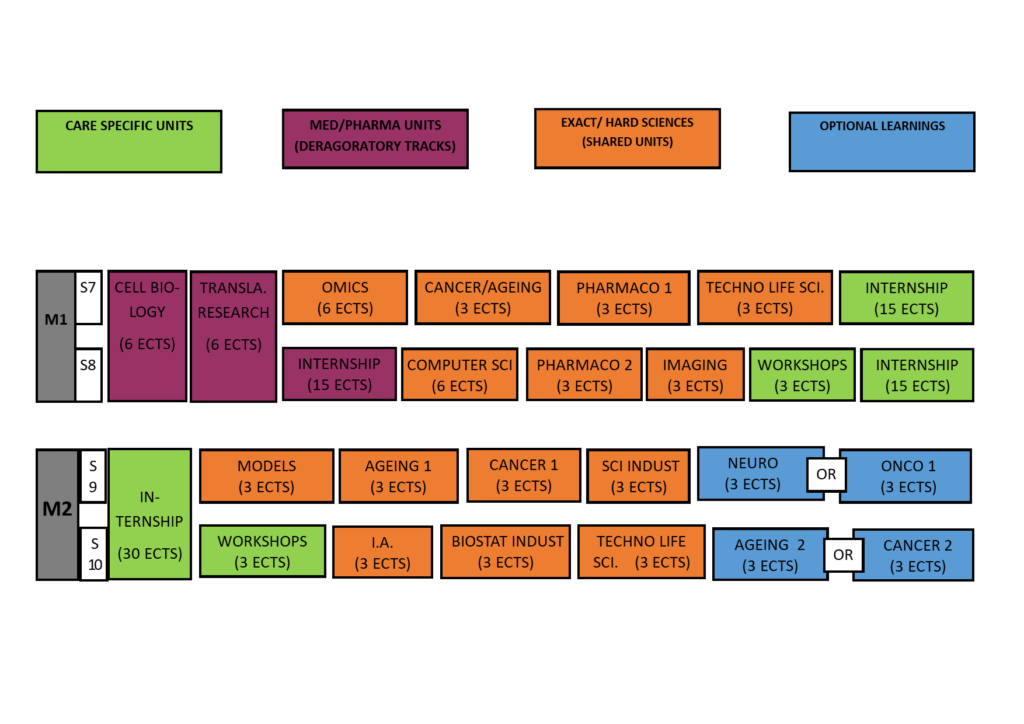MASTER
MASTER 1, MASTER 2
TRANSVERSAL TRAINING
The CARe Graduate School fully covers the training costs of 15,000 Euros per year, with the exception of administrative costs (approximately 350 Euros). CARe also offers gratuities for full-time internships of more than two months, in France and abroad.
Additionnally, international students can apply for a scholarship of 7 000 Euros per year, to cover their accommodation and personal expenses. A round-trip air ticket will be included. You will find more information on CARe’s scholarships here.
WORKSHOPS (3)
- Cancer / Ageing research updates B. Ségui & Ph. Valet
UPGRADING LEARNINGS (DEPENDING ON THE STUDENT ORIGINS)
- INFO: Basics in computational sciences and data management
- BIO 1/2: Basics in biology/health
- MATH: Basics in mathematics for living sciences
- PHYS: Basics in physics for living sciences
MANDATORY LEARNINGS
- OMICS (6): Large scale acquisistion and analysis in DNA/RNA/proteins/lipids/ metabolites N. Davezac
→ OMICS
- CANCER & AGEING (3): Molecular and cellular basis of cancer and ageing C. Dray & B. Ségui
- PHARMACOLOGY 1 (3): Pharmacological approaches for the study of life C. Dray & P. Valet
- TECHNOLOGIES FOR LIFE SCIENCES: theoretical aspects. Imaging for life sciences.V. Lobjois
→ TECHNOLOGIES FOR LIFE SCIENCES
- COMPUTER SCIENCES: Analysis and learning in massive data: from basic data to readable and useful. E. Claeys
- PHARMACOLOGY 2 (3): Innovative pharmacological strategies and therapeutic perspectives B. Guiard & Ph. Valet
- IMAGING (3): Exploring of life in imaging V. Lobjois
→ IMAGING
OPTIONAL LEARNINGS
- CELL BIOLOGY (6): Basic biology of the cell for emerging therapies J-C. Pagès & B. Ségui
- TRANSLA. RESEARCH (6): Fundamentals in translational research L. Keller & S. Trudel
MANDATORY LEARNING
9th semester:
- MODELS: Modeling & simulation: contribution of mathematics, computer science and physics, V. Lobjois (3 ECTS)
- AGEING 1: New challenges & specificities of clinical research in gerontology, C. Dray & S. Guyonnet (3 ECTS)
- CANCER 1: Antitumoral therapies, F. Thomas & F. Dalenc (3 ECTS)
- SCI. INDUST.: Knowledge of companies, business tools, Industrial property, quality & ethics, Ph. Valet (3 ECTS)
10th semester:
- BIOSTAT INDUST.: Applied biostatistics: analysis of medical science data, M. White-Koning (3 ECTS)
- A.I.: Intelligent digital architecture and data sharing/re-use for predictive medicine, R. VanRullen (3 ECTS)
- TECHNOLOGIES FOR LIFE SCIENCES: Practical approaches, F. Lopez & J. Rouquette (3 ECTS)
OPTIONAL LEARNING
9th semester:
- NEURO: Neurodegenerative processes, C. Florian & M.C. Miquel (3 ECTS), OR:
- ONCO: Clinical trials in onco-hematology, F. Despas & E.Chatelut (3 ECTS)
10th semester:
- AGEING 2: Cancer and ageing, B. Ségui & C. Dray (3 ECTS), OR:
- CANCER 2: Oncogene & tumor suppressor genes, microenvironment & emerging therapies, G. Favre (3 ECTS)
WORKSHOPS
- Cancer / Ageing research updates B. Ségui & Ph. Valet (3 ECTS)
INTERNSHIP
- 10-month part-time internship (30 ECTS)
all master promotions
The Toulouse Graduate School of Cancer Ageing and Rejuvenation (CARe) is a unique opportunity to promote one of the world highest quality education and research center in the shared fields of Cancer and Ageing. CARe is built on the outstanding activity of the TOUCAN LabEx, the WHO’s geriatric reference center (Gerontopole) and cancer hospital of Toulouse (IUCT) and on a strong network of international academic and industrial partnerships.
The main goal is to propose disruptive high-level education actions in the area of cancer, ageing, rejuvenation sciences and engineering in Toulouse through an international network. This new educational program, implemented in tight relation with research centers in Toulouse, aims at boosting scientific innovation from fundamental concepts to industrial and medical applications.
Master I
Benjamin Bauer: 2nd year of the University Toulouse 3 Medical School
Olivier Deny: 2nd year of the University Toulouse 3 Dentistry School who realised an internship at Restore lab (Team 4)
Samuel Lacoué-Labarthe: 2nd year of the University Toulouse 3 Medical School
Jijia Li: 2nd year of the University Toulouse 3 Medical School who realised an internship at the MDI Biological Laboratory in Maine (USA)
Félicitès Rapon: 2nd year the University Toulouse 3 of Pharmacy School who realised an internship at the Perilla Laboratory in the Delaware University (USA)
Ariane Sépart: 2nd year of the University Toulouse 3 Medical School
Marie-Françoise Tonamou: 2nd year the University Toulouse 3 of Pharmacy School
Djaphkah Torres Marzo: 2nd year the University Toulouse 3 of Pharmacy School
Dimitra Bozoglou: (Greece) Bachelor in Biology from the Aristotle University of Tessaloniki
Charles Du: Bachelor degree in cellular biology and physiology from the Toulouse III University
Louna Ferraty: Bachelor degree in cellular biology and physiology from the Toulouse III University
Valentin Fonvieille: Bachelor degree in cellular biology and physiology from the Toulouse III University
Masoud Ghanaatian: (Iran) Bachelor degree of science in Cell & Molecular Biology from the Islamic Azad University
Anissa Handjar: Bachelor degree in Biochemistry, Molecular Biology & Microbiology from the Toulouse III University
Kévin Joulié: Bachelor degree in cellular biology and physiology from the Toulouse III University
Julien Létoile: Bachelor degree in cellular biology and physiology from the Toulouse III University
Léana Nébot: Bachelor degree in cellular biology and physiology from the Toulouse III University
Matias Medina Tanco: (Argentina) Bachelor degree in Biology from the Universidad Autonoma de México
Léo Pécout: Bachelor degree in cellular biology and physiology from the Limoges University
Clémence Rouzier: Bachelor degree in cellular biology and physiology from the Toulouse III University
Ilias Simon: Bachelor degree in cellular biology and physiology from the Toulouse III University
Emily Tatareau: Bachelor degree in cellular biology and physiology from the Toulouse III University
Maxence Tricaud: inter-university Bachelor degree in Immunologies and biotherapies from The Sorbonne and the Toulon Universities
Maureen Verdier: Bachelor degree in cellular biology and physiology who is in the Stockholm University for an ERASMUS exchange.
Tab Content
Tab Content
Master II
Rémi Bueno: Master degree in Cancerology who realised an internship at the I2MC lab on « Study of the function of the circular RNA Prox1 in the lymphangiogenesis process«
Océane Dainese-Marque: Master degree in Cancerology who realised an internship at the CRCT on « Investigation of the effects associated with alterations in ceramide metabolism in the context of primary melanoma«
Lola Fauré: Master degree in « neuroscience, behavior, cognition » who realised an internship at the CRCA on « Immunoistochemistry«
Margaux Labrosse: Engineering Master degree from ENSAT (Es: Computational biology) who realised an internship at RESTORE on « Bioinformatics study of biological data: in particular Aging, regeneration and progenitor cells«
Tania Margarido Pereira (Andorra) : Master degree in Cancerology who realised an internship at the CRCT on « Impact of anti-TNF on T cell response to immune checkpoint inhibitors CTLA-4 and PD-1«
Fiorela Mego Ramirez (Peru): Master of Science and Researsch in medical oncology from the Peruvian University Cayetano Heredia who realised an internship at CRCT on « Advanced technologies for studying tumor microenvironment«
Marianna Plozza (Swittzerland): Master degree in « Genes, Cell & Development » who realised an internship at the IPBS Lab on « Aging and Cell Biology«
Quentin Rigaud: Master degree in Cancerology who realised an internship at IPBS Lab on « Centromeric transcription in cancer cells«
Mathilde Romano: Master degreein Physiopathology and 6th Year of Faculty of Pharmacy who realised her internship at RESTORE on « Effect of aging on the differentiation of conventional monocytes into aging MDSC«
Lucas Sibrac: 5th Year of Faculty of Pharmacy realised an internship at the Jules Brodet Institute (Belgium) on « Furthering our understanding of how tertiary lymphoid structures form and defining their immune functions in human breast cancer«
Miguel Thomas: Engineering Master degree from ENSAT (Es: Computational biology) who realised an internship at RESTORE on « Impact of age on tissue repair in the adult mammal: study of the role of mesenchymal stromal cells (MSCs) in the spatiotemporal regulation of tissue mechanical properties and tissue regeneration«
Romain Torres: Master degree in « immunology – infectious diseases » who realised an internship at Infinity (Team 10) on « Immunology and aging«
Manal Zguindou: Master degree from EPISEN school who realised an internship at RESTORE on « Biomaterial and macrophages and stromal cells«
Marcelo Hurtado Castillo (Peru): Current Master studies in Bioengeneering at the Universidad de Ingenirìa y Technologìa de Lima who realised an internship at the CRCT on « Computational Oncology«
Tab Content
Tab Content
